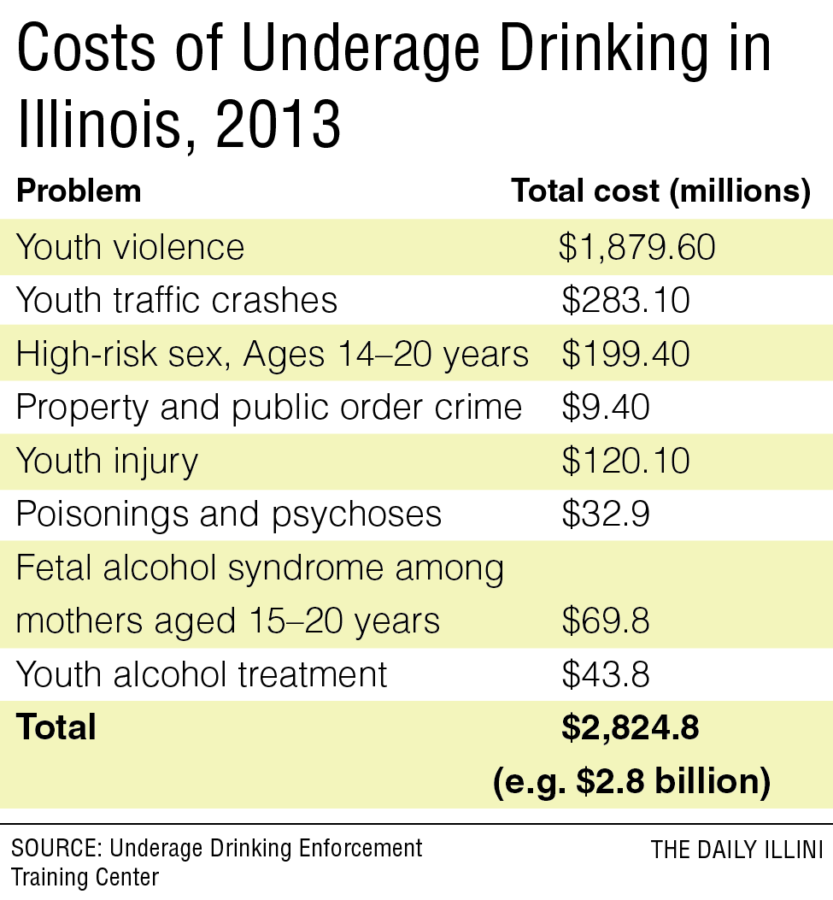Illinois passes new drinking immunity law for underage drinkers
Sep 7, 2015
Last updated on May 10, 2016 at 05:05 p.m.
Gov. Bruce Rauner recently passed a new law that could be potentially life saving for some underage drinkers in Illinois, but it may sound pretty familiar to University students.
The new law, which mirrors a policy already in practice at the University, states if a person is intoxicated and underage but calls 911 for medical help, neither the caller nor the person they are helping will be issued any citations. Rauner approved it on Aug. 24.
Skip Frost, deputy chief of police of the University of Illinois Police Department, who has been with the department since 1988, said the level of intoxication he and his officers encounter in underage drinkers is significantly higher than it has been in previous years.
“It used to be extremely rare that you came across someone so intoxicated they were unconscious, and now we see it all the time,” Frost said. “There are so many times we have someone who was victimized on this campus, and they can’t even provide us a description of their attacker because of their level of intoxication.”
Get The Daily Illini in your inbox!
UIPD Chief of Police Jeff Christensen said alcohol consumption is one of the key factors that leads to sexual assault.
“The number one date-rape drug isn’t roofies, it’s alcohol,” Christensen said. “So for students to understand that there’s no penalty for calling for help for somebody, anything we can do to facilitate the reporting of these incidents is very critical.”
However, contrary to popular belief, Frost said, the University’s police department doesn’t try to combat underage drinking with increased tickets.
“It just drives me mad that’s what everyone thinks our focus is – because it’s not. We are very focused on the harm reduction model,” he said. “You’re much more likely to get a referral to the Alcohol and Other Drug Office than you are to get cited.”
Yet, the idea that underage students believe the police department’s sole purpose is to crack down on illegal consumption of alcohol still remains.
“The only time I ever hear about police activity on campus is when it involves drinking tickets,” said Sophia Dearborn, a junior. “It feels like every weekend there’s some news on social media about University police assisting in a bar raid or breaking up a party and writing a lot of tickets.”
“If someone needs medical attention we’re not going to fight somebody for that,” Frost said.
The Illinois Student Senate has been advocating for a 911 immunity law since 2012. Former student senate president, Brock Gebhardt helped create House Bill 2341, the Alcohol Poisoning Immunity Bill.
The bill, which Gebhardt helped State Rep. Naomi Jakobsson, D-103, create sought to protect underage drinkers who call 911 for intoxicated people who need medical assistance for treatment of alcohol poisoning or other emergencies.
Mitch Dickey, senior in LAS and Illinois Student Senate president, said the 911 immunity law is significant because it will encourage people to focus on their safety and that of their peers, rather than the legal ramifications.
“Students are going to drink anyway,” he said. “When it comes down to their safety it makes complete sense to want to push your student — or just anyone underage — to do the right thing and call 911 to get help.”






